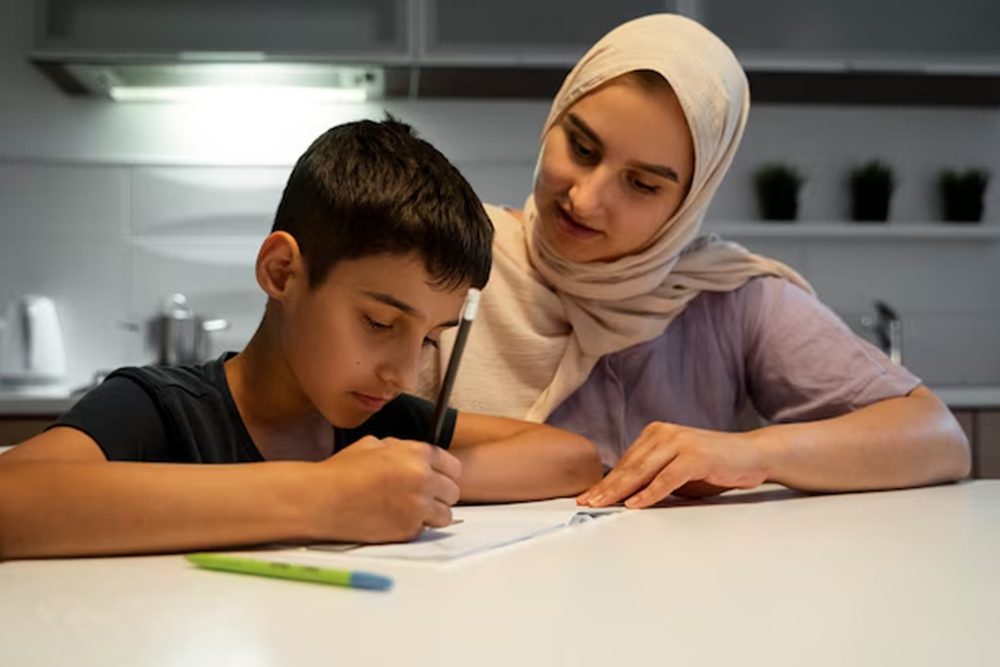Homeschooling is becoming the new norm in the UAE due to the annual increase in tuition fees. Whether you opt for public or private education for UAE residents can be costly. Therefore, to cut their expenses, people now prefer homeschooling their children.
The process of homeschooling in UAE is accessible and cost-effective due to the lower fee structure and no transport costs. Scroll down to learn how you can home-school your young one!
- Overview
- Procedure for Homeschooling in UAE
- Ministry Support for Home-Schooling Students
- Pros of Homeschooling in UAE
- Cons of Homeschooling in UAE
- Accredited Online Home Schools K-12
- Tips for Homeschooling in UAE
- FAQs

Homeschooling in UAE – Overview
The home-school system allows students to self-study at home without attending regular classes. Once the student registers, the educational zone provides books and necessary learning materials. Also, homeschooling enables students to study at their own pace.
Home-schooling standards in the UAE is equivalent to graduation from the best schools in the UAE. Despite covering the syllabus at home, students must sit for class exams at the year’s or semester’s end. These rules are set by the MOE’s:
- Assessment and Examinations Department
- Continuous Learning Department
Procedure for Homeschooling in UAE
The Ministry of Education in UAE mandates home-schooling for students over the maximum age limit for public school admission. The age timetable is issued at the start of each academic year.
The home-schooling stream in the UAE is open to students in grades 7 to 12. The students must be 14 years old to get admission to Grade 7. Homeschooling in UAE is open to all nationals and residents, including males and females, who meet the following requirements:
- Certificate for Passing the academic year. If you have international certificates, verify them with the UAE’s Ministry of Foreign Affairs and Ministry of Education.
- Copies of:
- Student’s passport
- Family book
- Residence visa
- Emirates ID
- 1 recent photograph
- Equivalency certificate for international students.
- Proof of payment of registration fees.

Ministry Support for Home-Schooling Students
The UAE’s education ministry communicates with home-schooling students and responds to all their queries. The ministry provides students with the following:
- Books
- Courses
- Examination dates
- Examination premises
MOE also assigns supervisors in each emirate to provide services to them in all aspects. The ministry also offers interested home-schooling students with ‘To whom it may concern certificates’ and ‘Education continuation certificates.’
Pros of Homeschooling in UAE
There are various advantages to homeschooling students in the UAE.

1. Flexible Curriculum
You can choose a curriculum according to your child’s interests and capacity. These curricula include British, American, Indian, etc. Parents can reduce homework by allowing their children to engage in enjoyable educational activities.
However, parents can find some best schools in the UAE with different curriculums. For instance, they can get their children admission in the British schools in Dubai.
2. Cost-Effective
Due to rising school fees globally, many parents are considering affordable education options like homeschooling. This way, parents can reduce their expenses on school and transportation fees. Meanwhile, parents can also find budget-friendly and affordable schools in Dubai.
3. Fun Extra-curricular Activities
Homeschooling your child is more manageable and fun when you engage them in extracurricular activities. Children can join social and educational clubs to enhance their public and academic skills.
4. Bonding With Family Members
With homeschooling in UAE, the parent-child bonds through:
- Active parental involvement
- Promoting open communication
- Mutual respect
- A deeper understanding of each other’s needs and aspirations
5. Less Social Pressure
Homeschooling helps students in the UAE overcome social pressures like bullying and peer pressure. UAE homeschooling system promotes self-confidence and social skills in a nurturing environment, thereby reducing the risk of judgment.

Cons of Homeschooling in UAE
The cons of homeschooling in the UAE are:
1. No Professional Training
The major challenge homeschooling faces is the lack of professional training among parents who act as educators. This potentially leads to learning gaps and other educational issues for students.
2. Less Motivated
At home, children get easily distracted and feel less motivated towards studies. This challenges parents to create a proper educational environment for their children.
3. No Standardised Assessments
Due to the lack of standardised tests, homeschooled children may face challenges in assessing their progress. They might struggle to compare them to their peers.
4. Less Social Interactions
Homeschoolers in the UAE may experience social isolation due to limited opportunities for socialisation. This potentially leads to social anxiety and other related issues. That’s where both public and private schools in the UAE play a vital role in grooming children for real-world roles.
5. A Lot of Discipline and Planning
Being a parent and teacher simultaneously is a challenging task, as you are responsible for:
- Creating a curriculum
- Administering exams
- Enforcing schedules
- Motivating your child
Along with these educational responsibilities, you must also perform your regular parenting duties, which can be tricky.
Accredited Online Home Schools K-12
K-12 homeschools refer to online schools for kindergarten to grade 12 students. In UAE, multiple accredited online homeschooling options provide a comprehensive curriculum and learning schedules for K-12 students.
The following are the accredited online home schools:
- K12
- Cambrilearn
- 21K School
- K8 Online School
- Bridgeway Academy
- iCademy Middle East
- Online British School
- Khan Academy
- Enlightium Christian Academy
- LEARN School and Academy
Tips for Homeschooling in UAE
Here are some pro tips for homeschooling in the UAE:
- Set up and decorate homeschool learning spaces for focus enhancement. It’s best to follow a professional decor guide for homeschool for better results.
- Keep up with a regular schedule for routine and structure.
- Carefully select a curriculum that aligns with the student’s learning style and goals.
- Encourage self-directed learning for a sense of independence.
- Implement regular progress assessments to gauge understanding.
- Learn new skills to diversify curricular and extracurricular activities.
- Connect with various communities for support and resources in better homeschooling.
- Prioritise health and well-being through breaks, physical activities, and mindfulness practices.
- Include real-life experiences to enhance knowledge implementation.
- Adopt flexibility to cater to different learning styles.
FAQs
Homeschooling is legal in the UAE, but parents must register and follow guidelines. They should choose a suitable curriculum based on their child’s needs and interests.
Yes, homeschooling is accepted in the UAE. Also, there are several KHDA-approved homeschools in Dubai, Sharjah, etc.
The annual cost of homeschooling in the UAE can vary from AED 5,000 to AED 20,000, depending on factors like:
– Curriculum
– Resources
– Extracurricular activities
The government-supported homeschooling program in Dubai caters to students of grades seven to twelve who missed their early education.
Homeschooling in Dubai operates without official classes, with educational zones providing books, materials, and supervision from appointed supervisors. However, if you want your children to follow a specific curriculum, you can find some best private schools in Dubai as per the KHDA ratings.
Through our guide, you will learn the complete homeschooling procedure in the Emirates. Like any other thing, homeschooling in the UAE also has pros and cons. However, with dedication and a proper environment, you can easily homeschool your child in the UAE.
For more on the UAE’s education standards, check out Property Finder blogs.